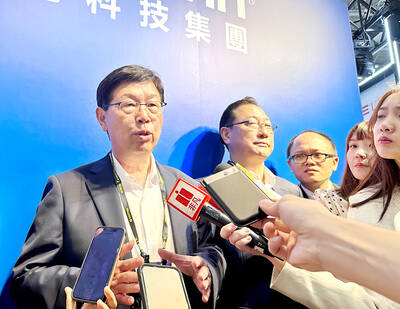The nation’s listed companies reported combined Chinese investment gains of NT$122.6 billion (US$4.31 billion) in the third quarter, up 21 percent year-on-year and hitting a high for the period, the Financial Supervisory Commission (FSC) said on Thursday.
The commission attributed the gains to listed firms’ investments in 5G communication products and consumer electronics, as China is deploying its commercial 5G networks and some people continue to work from home.
Despite growing investment gains, listed firms continued trimming their investments in China for a second consecutive quarter, with accumulated investment sliding to NT$2.5161 trillion as of the end of September, down NT$8.3 billion from NT$2.5244 trillion at the end of June, commission data showed.
The number of listed firms with investments in China stood at 1,190 — or 73 percent of all 1,613 listed companies in Taiwan, the data showed.
Eight listed companies exited the Chinese market in the first three quarters of the year, the second highest total since 11 withdrew in 2016, the commission said.
Most of the eight companies left to stem losses or pursue a new operational strategy, Securities and Futures Bureau Chief Secretary Kuo Chia-chun (郭佳君) told a news conference in New Taipei City.
“Listed companies’ performance in China seemed mixed, as some industries seized more opportunities and continued expanding their investments, such as the computer sector and the electronic components sector, while other opted to leave,” Kuo said.
Listed companies repatriated NT$37.4 billion of investment gains to Taiwan during the first three quarters, raising accumulated repatriated funds to NT$528 billion, data showed.
Cumulative overseas investment gains by listed firms stood at NT$276.9 billion for the January-to-September period, up 29.8 percent from a year earlier, the data showed.

Taiwan Transport and Storage Corp (TTS, 台灣通運倉儲) yesterday unveiled its first electric tractor unit — manufactured by Volvo Trucks — in a ceremony in Taipei, and said the unit would soon be used to transport cement produced by Taiwan Cement Corp (TCC, 台灣水泥). Both TTS and TCC belong to TCC International Holdings Ltd (台泥國際集團). With the electric tractor unit, the Taipei-based cement firm would become the first in Taiwan to use electric vehicles to transport construction materials. TTS chairman Koo Kung-yi (辜公怡), Volvo Trucks vice president of sales and marketing Johan Selven, TCC president Roman Cheng (程耀輝) and Taikoo Motors Group

Among the rows of vibrators, rubber torsos and leather harnesses at a Chinese sex toys exhibition in Shanghai this weekend, the beginnings of an artificial intelligence (AI)-driven shift in the industry quietly pulsed. China manufactures about 70 percent of the world’s sex toys, most of it the “hardware” on display at the fair — whether that be technicolor tentacled dildos or hyper-realistic personalized silicone dolls. Yet smart toys have been rising in popularity for some time. Many major European and US brands already offer tech-enhanced products that can enable long-distance love, monitor well-being and even bring people one step closer to

RECORD-BREAKING: TSMC’s net profit last quarter beat market expectations by expanding 8.9% and it was the best first-quarter profit in the chipmaker’s history Taiwan Semiconductor Manufacturing Co (TSMC, 台積電), which counts Nvidia Corp as a key customer, yesterday said that artificial intelligence (AI) server chip revenue is set to more than double this year from last year amid rising demand. The chipmaker expects the growth momentum to continue in the next five years with an annual compound growth rate of 50 percent, TSMC chief executive officer C.C. Wei (魏哲家) told investors yesterday. By 2028, AI chips’ contribution to revenue would climb to about 20 percent from a percentage in the low teens, Wei said. “Almost all the AI innovators are working with TSMC to address the

FUTURE PLANS: Although the electric vehicle market is getting more competitive, Hon Hai would stick to its goal of seizing a 5 percent share globally, Young Liu said Hon Hai Precision Industry Co (鴻海精密), a major iPhone assembler and supplier of artificial intelligence (AI) servers powered by Nvidia Corp’s chips, yesterday said it has introduced a rotating chief executive structure as part of the company’s efforts to cultivate future leaders and to enhance corporate governance. The 50-year-old contract electronics maker reported sizable revenue of NT$6.16 trillion (US$189.67 billion) last year. Hon Hai, also known as Foxconn Technology Group (富士康科技集團), has been under the control of one man almost since its inception. A rotating CEO system is a rarity among Taiwanese businesses. Hon Hai has given leaders of the company’s six